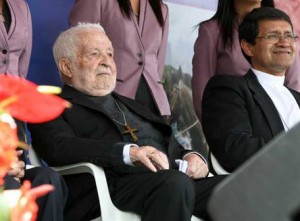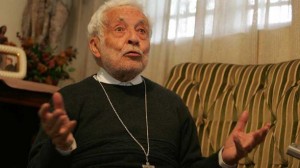At the age of 94 years, Mons. Luis Alberto Luna Tobar, Discalced Carmelite and Archbishop Emeritus of Cuenca, died last February the 7th in Quito, Ecuador.
Mons. Luna was born on the 15th of December, 1923, into a well-to-do family from Quito. He became acquainted with Carmel in a visit he made to the Sucumbios mission with some friends, three of whom entered the Order with him, out of admiration for the friars and more specifically, using their own words, attracted by “their life, their happiness, their training, what they were like”.
As it turned out, he was the only one to persevere and was sent to study in Spain. At that time he became the first Ecuadorian to take the Carmelite habit, which happened at Burgo de Osma on the 3rd of August, 1939. He was ordained priest on the 25th of July, 1946, in the Carthusian Charterhouse in Miraflores, Burgos. Once ordained priest, he went back almost immediately to Quito and was appointed Pastor of the church of Saint Therese, where for 22 years, he worked tirelessly up until 1968 as Pastor, becoming the “fashionable” priest, there being no baptism, confession or marriage that he did not do. He had a certain charism for inspiring confidence, he became advisor to numerous well-known political people and those of the social world in the Capital. He was also professor in the Catholic University and in 1972 was appointed a member of the Ecuadorian Academy of Language. From 1970 to 1973 he was Definitor General of the Order. In 1977 he was named Auxiliary Bishop of Quito. But this great Bishop, great shepherd, great friend of the poor and country folk was to emerge as Archbishop of Cuenca in 1981. He was received with suspicion and distrust by the clergy in Cuenca, thinking him as rather elitist because of his origin and his term as Auxiliary of Quito. Accompanied by his rural Pastoral Vicar, Fr Hernán Rodas, he was to visit even the remotest corner of the diocese. In doing this he found conversion. The very spirit he had shown in Quito for receiving political personages, aristocratic and cultural people . . . was to become in harmony with the country folk: “My greatest pleasure is to be understood by the country people, we get on so well together”.
In this way, he became known as “the Bishop of the poor” and “the Bishop who makes no distinction” or by his own fellow Bishops, who acknowledged him as “the prophet of Ecuador!” His death has caused an enormous impact on the Ecuadorian Church and society, to the extent that President Correa himself publically lamented his death and gave the funeral elegy for Mons. Luna.
Together with Mons. Proaño, dead now for nearly 30 years and our Mons Gonzalo, who was recently taken from us, he formed the most notable group of Bishops involved in leading the reform that followed Vatican II, as well as the meetings of the Latin-American and Carribean Bishops celebrated in Medellin and Puebla.
May our brother rest in peace.


















